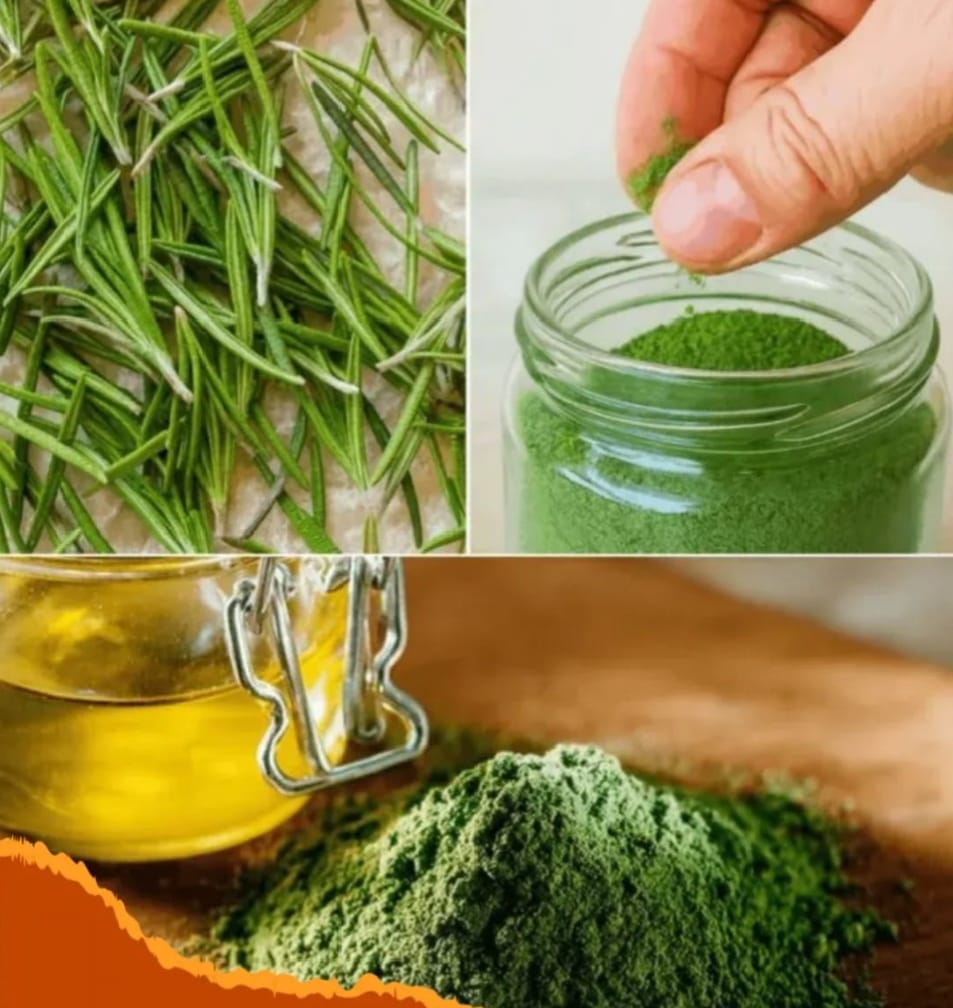Homemade Rosemary Powder Uses Strong and Aromatic Botanical
Made from dried rosemary leaves, rosemary powder is a potent and aromatic herbal powder that has been used for ages in traditional medicine and cookery.
In addition to enhancing culinary meals, rosemary’s earthy, slightly bitter flavor and pine-like scent have remarkable health advantages. A practical method to fully utilize the benefits of this age-old Mediterranean herb is using handmade rosemary powder, which is rich in antioxidants, anti-inflammatory chemicals, and vital nutrients.
Equipment Needed:
To prepare high-quality rosemary powder at home, you’ll need:
Fresh rosemary sprigs
A colander or strainer
Clean kitchen towel or paper towels
Baking tray or dehydrator
Oven or dehydrator (optional, for drying)
Grinder, spice mill, or mortar and pestle
Airtight glass jar or spice container for storage
How It Works:
Rosemary contains potent compounds such as rosmarinic acid, carnosic acid, and camphor, which contribute to its antioxidant, anti-inflammatory, and antimicrobial effects. When you grind dried rosemary into powder, you preserve these active compounds in a concentrated form, making it easy to add to teas, foods, or even skin and hair treatments.
The powder works by:
Supporting healthy digestion and circulation
Reducing oxidative stress in the body
Boosting brain and memory function
Helping detoxify the liver and improving immunity
How to Prepare Rosemary Powder (Step-by-Step Process):
Step 1: Wash and Clean
Rinse fresh rosemary sprigs under cold water to remove dirt or debris. Shake off excess water and pat dry thoroughly using a clean towel.
Step 2: Remove Leaves
Gently strip the leaves from the woody stems. Discard stems (or save for flavoring soups).
Step 3: Dry the Leaves
You can dry rosemary in several ways:
Air-drying: Spread the leaves on a tray in a single layer and place them in a dry, shaded area for 5–7 days.
Oven-drying: Preheat oven to 95°C (200°F). Place leaves on a baking tray and dry for 1–2 hours, stirring occasionally.
Dehydrator: Dry at 95°F for 1–3 hours until completely crisp.
Step 4: Grind the Dried Leaves
Once fully dry and crisp, transfer the leaves into a spice grinder, blender, or mortar and pestle. Grind until you get a fine powder.
Step 5: Store
Transfer the powder to an airtight glass jar. Store in a cool, dark place away from moisture and sunlight. It can last for up to 6 months with proper storage.
How to Use Rosemary Powder:
Rosemary powder can be used in various ways:
Culinary: Add ¼–½ teaspoon to soups, stews, roasted vegetables, or meat marinades.
Tea: Mix ½ teaspoon in hot water, steep for 5–7 minutes, and strain before drinking.
Hair & Skin Care: Mix with coconut or olive oil to use as a scalp treatment or face mask.
Aromatherapy: Add to potpourri or bath salts for relaxation and mental clarity.
Health Benefits of Rosemary Powder:
Benefit | Description |
|---|---|
| Improves Memory & Focus | The active compounds increase blood flow to the brain and enhance concentration. |
| Supports Digestion | Helps relieve bloating, gas, and indigestion by stimulating digestive enzymes. |
| Boosts Immunity | Rich in antioxidants that strengthen the body’s natural defense system. |
| Anti-Inflammatory | Reduces inflammation and may help with arthritis and muscle pain. |
| Hair Growth & Scalp Health | Improves circulation in the scalp, encouraging hair growth and reducing dandruff. |
| Liver Detoxification | Supports liver enzymes and helps flush out toxins. |
| Heart Health | Improves circulation and may help lower blood pressure slightly. |
When to Take Rosemary Powder:
Morning: For energy, focus, and digestion.
After Meals: To improve digestion and reduce bloating.
Before Study or Work: As a natural memory and concentration booster.
How Much Quantity to Use:
As a spice: ¼ teaspoon per serving
As tea: ½ teaspoon per cup of hot water
For health benefits: Up to 1 teaspoon daily is safe for most adults
(Always start small and increase gradually.)
Safety and Cautions:
Avoid consuming excessive amounts; large doses may cause stomach upset.
Pregnant and breastfeeding women should consult a doctor before use.
People with high blood pressure or seizure disorders should use it cautiously.
Avoid applying concentrated rosemary powder directly to skin without dilution.
Keep out of reach of children and store away from heat or humidity.
Common Questions & Answers:
Q1: Can I use rosemary powder instead of fresh rosemary in recipes?
A: Yes! Use 1 teaspoon of rosemary powder for every 1 tablespoon of fresh rosemary.
Q2: Can rosemary powder help with hair growth?
A: Yes. When mixed with oil and massaged into the scalp, it improves circulation and promotes hair growth naturally.
Q3: Can I drink rosemary tea every day?
A: Yes, 1 cup per day is generally safe and beneficial, but take breaks every few weeks.
Q4: Does rosemary powder help in weight loss?
A: Indirectly. It supports digestion, reduces inflammation, and balances metabolism, which aids weight control.
Q5: How long does rosemary powder stay fresh?
A: Up to 6 months if stored in an airtight container in a cool, dry place.
Concluding Remarks:
A straightforward but effective natural cure and flavor enhancer is homemade rosemary powder. You can guarantee freshness and purity without artificial ingredients by making it yourself.
Rosemary powder offers a plethora of health and beauty advantages, whether it is added to your favorite food, brewed as tea, or used for hair and skin care. This fragrant herb can become your kitchen and wellness partner if you use it mindfully and in moderation.

